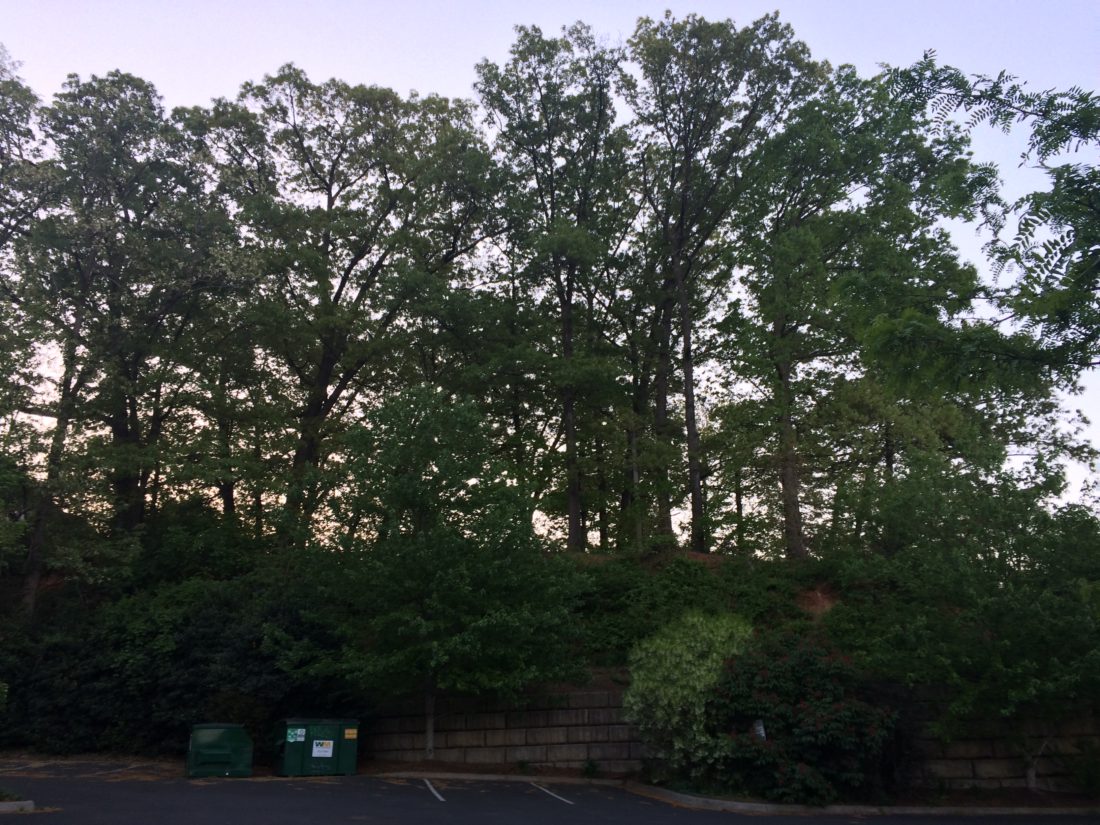Asheville Planning & Zoning Commission recommends denial of tree protection ordinance
Stronger protections for Asheville’s rapidly dwindling urban forest were shot down in a July 1 vote by the city’s Planning & Zoning Commission. In a 6-1 decision, with member Guillermo Rodriguez dissenting, the commission found that the proposal didn’t adequately balance development affordability and density with tree protection.
As outlined by city planner Chris Collins in a presentation to the commission, the new rules would have required all subdivisions, new construction and large expansions to have certain levels of tree canopy coverage. Those requirements, which ranged from 5% for downtown developments to 30% in certain suburban areas, could be met by preserving existing trees, planting new growth or making a “payment-in-lieu” for the city to plant trees elsewhere.
Commission Chair Laura Hudson argued that the rules placed too much emphasis on tree protection and could become an untenable burden for developers. “If you jam too many requirements onto one small parcel, I think you’re going to kill the development altogether,” she said. “Not that we want great big developments without trees — I’m just saying we want quality developments.”
But Sharon Sumrall, a member of the city’s Urban Forestry Commission who helped develop the proposal, said strong moves were needed in light of what she called an “alarming” NASA study about tree canopy loss and urban heat islands in Asheville. Released in fall 2019, that research found many of the city’s poorer areas to have less tree cover than wealthier neighborhoods, making them more vulnerable to extreme heat and the resulting health impacts.
“It comes to a philosophical point of, ‘What do you want your downtown and your city to look like?’” Sumrall said. “At affordable housing, we should also have trees.”
Because the commission’s vote is only advisory, Asheville City Council will have the final say on whether to approve the new rules. Collins said Council is expected to take up the issue in August.
State climate report flags increased WNC landslide, wildfire risks
One crisis doesn’t stop just because another starts.
Amid the state’s ongoing management of COVID-19, the N.C. Department of Environmental Quality has published the Climate Risk Assessment and Resilience Plan (avl.mx/7i3) mandated as part of Gov. Roy Cooper’s response to climate change. While the report covers the entire state, it notes that Western North Carolina in particular is likely to see more severe landslides and wildfires as climate change progresses.
Heavy rain events with the potential to destabilize slopes, the report explains, are projected to become more common in the coming years. In conjunction with increased development in the mountains and aging drainage systems, the resulting landslides could have substantial impacts.
“As population increases, so does the dependence on critical infrastructure,” notes the report. “When major transportation corridors like [Interstate] 40 are impacted by landslides, disruption and economic losses are felt over large areas in the mountains because alternate routes are limited by terrain constraints.”
Severe droughts are also likely to become more frequent and intense, leading to conditions that promote wildfires in WNC’s forests. The report identifies Henderson, Buncombe, Cleveland, Burke, Catawba and Iredell counties as being at particular risk.
That increased risk comes as North Carolina’s capacity to respond to wildfires is deteriorating. “The state fleet of bulldozers used to create fire breaks and the transport systems used to carry them are well behind the desired replacement schedule,” the report says. “This aging fleet is resulting in increased maintenance costs and longer downtimes due to nonavailability of parts.”
WNC turkey harvest hits record high

COVID-19 doesn’t infect birds, but the pandemic has nonetheless proved fatal for many of WNC’s wild turkeys. According to the N.C. Wildlife Resources Commission, hunters with more time on their hands due to statewide stay-home orders harvested a record 4,234 turkeys in the mountain region over the five-week season from April 11 to May 9, up more than 14% compared with the average of the previous three years.
The increase was even greater in Buncombe County than in the mountains as a whole: Buncombe hunters took 419 turkeys this season, more than 40% over the previous three-year average. However, wildlife managers say that the larger harvest won’t necessarily cause turkey populations to suffer going forward.
“Our turkey population is very robust, and in most areas, it can handle this additional harvest and hunting pressure quite well,” said Chris Kreh, the agency’s wild turkey biologist, in a press release about the recent season. “Hunters may hear fewer gobblers than they are used to for the next year or two, but since hens and reproductive output are still largely protected, I don’t expect the overall population to decline.”
Nonprofit news
- A recently established nonprofit, Exotic Animal Rescue and Sanctuary, unveiled plans to open an Asheville-area facility by July 2022. According to a press release about the move, the sanctuary would provide “a permanent home for those animals that were born in captivity and cannot be released into the wild,” as well as “rehabilitation services to injured and orphaned native wildlife.”
-

LEND A PAW: Chelsea Heath, executive director of Asheville-based Exotic Animal Rescue and Sanctuary, greets a tiger. Photo courtesy of EARS In support of the Oak Hill Community Park and Forest project in Morganton, the Foothills Conservancy of North Carolina received a grant of over $464,000 from the U.S. Forest Service. The conservancy must still raise $440,000 by the end of September to finalize its purchase of the 651-acre property, which will host public trails and environmental education programs.
- Andy Williamson was appointed the first executive director of Asheville-based Outdoor Gear Builders, a nonprofit coalition of area outdoor industry leaders. Williamson, the principal of outdoor consultancy Active Strategies, will work part-time to expand the organization’s membership and further its strategic goals.
- Mountain Housing Opportunities received a $125,000 grant from the TD Charitable Foundation to install solar panels and water efficiency retrofits in affordable housing rentals throughout WNC. “Improving the energy and water efficiency of our apartments is not only the environmentally sustainable thing to do, but it also creates long-term economic benefits that help us improve the financial security of the families we serve,” said Scott Dedman, MHO’s executive director, in a press release announcing the award.
- On June 5, the Southern Appalachian Highlands Conservancy finalized its purchase of a 448-acre tract at Chestnut Mountain in Haywood County. The nonprofit plans to donate the property to the town of Canton for management as a “natural resource protective public outdoor recreation park.”
Get involved
- The French Broad River Metropolitan Planning Organization seeks public comment on a draft plan for the Hellbender Regional Trail through Friday, Aug. 21. The proposed network of bicycle and pedestrian paths would link communities throughout Buncombe, Henderson, Haywood, Madison and Transylvania counties. More information and a comment form are available at avl.mx/7hs.
- Duke Energy has opened its Renewable Advantage program to residential customers, allowing them to purchase renewable energy certificates as part of monthly billing. For each $3 block purchased, Duke will donate 50 cents to NC GreenPower’s Solar+ Schools program, which provides grants for solar power at the state’s K-12 schools. More information at avl.mx/7hu.
- The Ravenscroft Reserve Initiative continues to raise funds to preserve a stand of mature oak trees at 11 Collier Ave. in Asheville, a property currently slated for an affordable housing development. Donations to the RRI can be made through Asheville GreenWorks, which took over fiscal sponsorship of the effort from MountainTrue on July 1. More information at avl.mx/7jg.
- The Southern Appalachian Highlands Conservancy is seeking public comment on its reaccreditation as a land trust. Comments should describe how SAHC complies with the national standards of the Land Trust Alliance, available at avl.mx/7jz. Comments may be emailed to info@landtrustaccreditation.org or faxed to 518-587-3183.
Community kudos
-

WINGED VICTORIES: Jean Marie Dillon’s photo of a northern pearly-eye butterfly, left, and Andy MacPhillimy’s green metallic sweat bee photo took top honors in the Pollinator Photo Contest hosted by Asheville GreenWorks and Bee City USA – Asheville. Photos courtesy of Bee City USA – Asheville Jean Marie Dillon was announced as the overall winner of the first Pollinator Photo Contest, hosted by Asheville GreenWorks and Bee City USA – Asheville, for her picture of a northern pearly-eye butterfly. Andy MacPhillimy took first place in the adult category for his snap of a green metallic sweat bee. Other winning photos will be shared through GreenWorks and Bee City USA social media in the coming weeks.
- Asheville-based outdoors writer Danny Bernstein announced the forthcoming release of her newest book, DuPont Forest: A History, through Arcadia Publishing on Monday, Sept. 7. Bernstein has previously written about the forest’s past for Xpress.
- In partnership with the Blue Ridge Parkway Foundation’s Kids in Parks program, Buncombe County Parks and Recreation installed a TRACK Trail at Charles D. Owen Park in Swannanoa. The trail features educational activity guides for young hikers, who can earn prizes by tracking their outdoor excursions through KidsInParks.com.
- The Buncombe County Farm Heritage Trail was recognized with the National Association of Counties 2020 Achievement Award. Established by the Buncombe County Soil and Water Conservation District, the driving route connects several conserved family farms in Alexander, Leicester, Newfound and Sandy Mush.




Before you comment
The comments section is here to provide a platform for civil dialogue on the issues we face together as a local community. Xpress is committed to offering this platform for all voices, but when the tone of the discussion gets nasty or strays off topic, we believe many people choose not to participate. Xpress editors are determined to moderate comments to ensure a constructive interchange is maintained. All comments judged not to be in keeping with the spirit of civil discourse will be removed and repeat violators will be banned. See here for our terms of service. Thank you for being part of this effort to promote respectful discussion.